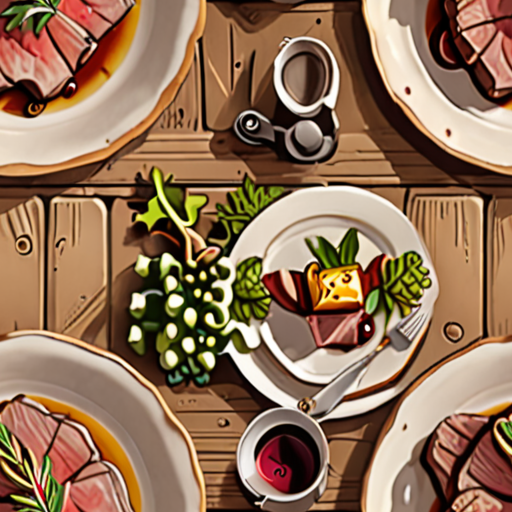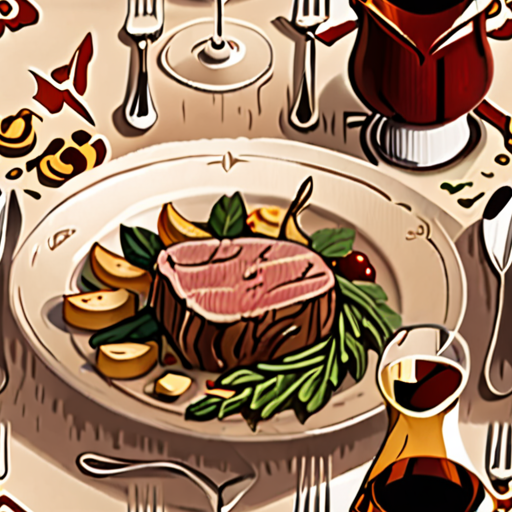In the realm of culinary arts, the quest for the perfect wine pairing elevates the dining experience to new heights, especially when it comes to pairing red wines with beloved meats like beef, tenderloin, and even the classic meatloaf. Understanding the intricate dance between the robust flavors of red wine and the diverse textures of meat creates a harmonious symphony on your palate. This guide delves into the secrets of expert red wine pairings, navigating through the complexities of tannins and acidity, and uncovering the best red wines for different cuts and preparations of beef, from the hearty stew to the elegant tenderloin. Discover time-honored combinations and explore novel pairings to enhance your culinary repertoire. Whether you’re curious about what goes best with meat or seeking guidance on white wine alternatives for beef, this article provides comprehensive insights and expert tips to refine your wine and meat pairing skills, ensuring each meal is not just a meal, but an unforgettable experience.
Choosing the Perfect Wine to Pair with Meat
When it comes to selecting the ideal wine to accompany your favorite meat dishes, there are several factors to consider.
- Tannin Levels: Tannins are compounds found in the skin, seeds, and stems of grapes, which contribute to the bitterness and astringency of wine. High-tannin wines pair well with rich cuts of meat, such as Wagyu ribeye, while low-tannin wines complement more delicate textures and flavors.
- Acidity: Acidity helps balance the richness of meat, cutting through its fattiness and enhancing overall flavor. Wines with high acidity, like those made from Chardonnay or Sauvignon Blanc, work well with fatty meats.
- Fruit Flavor: Fruity wines can complement sweet or savory flavors in meat, depending on the type of fruit present. For example, a wine with notes of dark fruit pairs well with grilled meats, while citrusy wines suit lighter preparations.
Recommended Wine Pairings for Popular Meats
- Wagyu Ribeye: A full-bodied red wine with high tannins, such as Cabernet Sauvignon or Syrah/Shiraz, complements the rich flavor and tender texture of Wagyu ribeye.
- Lamb: A medium-bodied red wine with moderate tannins, like Pinot Noir or Grenache-based blends, suits the delicate flavor and firm texture of lamb.
- Eye Fillet: A light-bodied red wine with low tannins, such as Beaujolais or Valpolicella, pairs well with the lean flavor and tender texture of eye fillet.
Additional Tips for Wine and Meat Pairing
- Cooking Methods: Grilled meats benefit from smoky, full-bodied wines, while roasted meats require more elegant, refined wines.
- Sauce and Seasonings: Rich sauces and seasonings demand robust wines, while lighter preparations call for crisper, fresher wines.
- Personal Preference: Ultimately, the perfect wine pairing depends on individual taste preferences, so don’t be afraid to experiment and find your own favorites!
Choosing Between Red and White Wine with Beef
The age-old debate about whether to pair red or white wine with beef has been a topic of discussion among wine enthusiasts for years.
- While many people swear by the classic combination of red wine and beef, others argue that white wine can be a better match depending on the cut and cooking method.
- In general, red wine tends to pair well with richer, fattier cuts of beef, such as ribeye or porterhouse, due to its bold flavors and tannins.
- On the other hand, white wine can complement leaner cuts of beef, such as sirloin or tenderloin, with its crisp acidity and delicate flavors.
Consider the Cooking Method
The way beef is cooked can also impact which type of wine pairs better with it.
- For example, grilled or pan-seared beef can benefit from the smoky, charred flavors of a full-bodied red wine, such as Cabernet Sauvignon or Syrah/Shiraz.
- On the other hand, slow-cooked beef, such as braised short ribs or pot roast, may pair better with a rich, fruity red wine, such as Merlot or Pinot Noir.
Don’t Forget About Personal Preference
Ultimately, the choice between red and white wine with beef comes down to personal preference.
- If you prefer a bolder, more full-bodied flavor, red wine may be the way to go.
- If you prefer a crisper, more refreshing taste, white wine could be the better option.
Tips for Pairing Wine with Beef
Here are a few general tips to keep in mind when pairing wine with beef:
- Experiment with different types of wine to find what works best for you.
- Consider the flavor profile of the dish and choose a wine that complements it.
- Don’t be afraid to try new combinations – you might be surprised at how well certain wines pair with beef!

Choosing the Perfect Wine for a Hearty Meat Meal
When it comes to pairing wine with a meal mainly consisting of meat, there are several factors to consider. The type of meat, cooking method, and personal taste preferences all play a role in selecting the ideal wine. In general, a robust and full-bodied wine is well-suited to complement the rich flavors of meat.
- Cabernet Sauvignon: A classic choice for pairing with steak, Cabernet Sauvignon offers a perfect balance of tannins and acidity to cut through the richness of the meat.
- Malbec: Hailing from Argentina, Malbec is known for its velvety texture and dark fruit flavors, making it an excellent match for grilled meats.
- Syrah/Shiraz: This varietal is renowned for its spicy and peppery notes, which pair beautifully with the bold flavors of lamb and beef.
- Merlot: While often overlooked, Merlot can be a great option for those who prefer a smoother, more approachable wine to pair with their meat dishes.
When selecting a wine to pair with your meat meal, consider the following tips:
- Look for wines with high tannin levels, as these will help to balance the richness of the meat.
- Choose wines with bright acidity, as these will help to cut through the fattiness of the meat.
- Consider the cooking method: Grilled meats tend to pair better with wines that have smoky or charred notes, while roasted meats may benefit from wines with earthy or mushroom undertones.
- Don’t be afraid to experiment and try new combinations – the world of wine and meat pairing is vast and exciting!
At Fine Vines, we believe that the perfect wine pairing is a matter of personal preference. Feel free to explore our selection of fine wines and discover your own favorite pairings.
Choosing the Perfect Wine to Pair with Chicken and Beef
When it comes to selecting the ideal wine to pair with chicken and beef, there are several factors to consider. In this article, we’ll explore the world of wine pairing and provide you with expert advice on how to choose the perfect bottle to complement your favorite dishes.
For those who enjoy cooking chicken, a crisp and refreshing white wine is often the perfect match. Some popular options include Sauvignon Blanc, Pinot Grigio, and Riesling. These wines tend to have citrus and green apple notes that complement the delicate flavors of chicken.
On the other hand, beef lovers may prefer a full-bodied red wine that can stand up to the rich flavors of a perfectly grilled steak. Cabernet Sauvignon, Syrah/Shiraz, and Malbec are excellent choices, as they offer complex flavor profiles with hints of dark fruit, spice, and subtle tannins.
- Sauvignon Blanc: A crisp and refreshing white wine with citrus and green apple notes that pairs well with chicken.
- Cabernet Sauvignon: A full-bodied red wine with complex flavor profiles and hints of dark fruit, spice, and subtle tannins that pairs well with beef.
- Pinot Grigio: A light-bodied white wine with floral and fruity aromas that complements the delicate flavors of chicken.
- Syrah/Shiraz: A full-bodied red wine with dark fruit flavors and spicy undertones that pairs well with beef.
- Riesling: A white wine with high acidity and flavors of green apple and honey that pairs well with chicken.
- Malbec: A full-bodied red wine with plum and blackberry flavors and smooth tannins that pairs well with beef.
Additional Tips for Wine Pairing
When it comes to wine pairing, there are several additional factors to consider beyond just the type of meat. Some key considerations include:
- The level of doneness: A rare steak requires a bold red wine, while a well-done steak can handle a lighter-bodied wine.
- The seasonings and marinades: Spicy or smoky flavors require a wine with a strong backbone, while herbs and spices can be paired with a variety of wines.
- The sauce or gravy: A rich and savory sauce can overpower a delicate wine, while a light and acidic sauce can cut through a robust wine.
Conclusion
Wine pairing is an art that requires experimentation and patience. By considering the type of meat, level of doneness, seasonings, and sauces, you can find the perfect wine to complement your favorite dishes. Whether you’re a seasoned wine enthusiast or just starting out, remember to always trust your palate and experiment with different combinations to find your perfect match.
Choosing the Perfect Wine to Pair with Chicken
When it comes to selecting the ideal wine to pair with chicken, there are several factors to consider, including the type of chicken dish, personal taste preferences, and the overall flavor profile of the meal.
For those who prefer white wine, a crisp and refreshing glass of Sauvignon Blanc or Pinot Grigio can complement the delicate flavors of chicken breast perfectly.
On the other hand, if you’re in the mood for something richer and more full-bodied, a medium-bodied red wine like Pinot Noir or Beaujolais can pair nicely with darker meats like chicken thighs or legs.
In addition to these classic pairings, there are many other options to explore, depending on the specific ingredients and seasonings used in your chicken dish.
- Sauvignon Blanc: A zesty and citrusy white wine that pairs well with lighter chicken dishes, such as grilled chicken or chicken salads.
- Pinot Grigio: A crisp and refreshing white wine that complements the delicate flavors of chicken breast.
- Pinot Noir: A light-bodied red wine with flavors of cherry and earth that pairs nicely with darker meats like chicken thighs or legs.
- Beaujolais: A fruity and approachable red wine that pairs well with rich and savory chicken dishes, such as chicken stews or casseroles.
Ultimately, the perfect wine to pair with chicken is one that complements the flavors of the dish without overpowering them.
Experiment with different types of wine and find the perfect match for your favorite chicken recipes.

What Wine Goes with What Protein?
The age-old question of wine pairings can seem daunting, but fear not, fellow wine enthusiasts! As a seasoned connoisseur, I’m here to guide you through the world of wine and protein pairings.
- Red Meat: Ah, the classic combination of red meat and red wine. Beef, lamb, and venison all pair beautifully with full-bodied reds like Cabernet Sauvignon, Syrah/Shiraz, and Malbec. These wines complement the rich flavors of these meats, creating a match made in heaven.
- White Meat: For those who prefer poultry or pork, white wine is the way to go. Chardonnay, Pinot Grigio, and Sauvignon Blanc are excellent choices to pair with chicken, turkey, or pork. These crisp and refreshing whites cut through the richness of these meats, leaving you wanting more.
- Fish and Seafood: When it comes to delicate fish and seafood, a lighter-bodied white wine is the perfect choice. Pinot Grigio, Albariño, and Grüner Veltliner are great options to pair with fish, shrimp, or scallops. These wines won’t overpower the subtle flavors of these dishes, allowing you to fully appreciate their nuances.
Additional Tips and Tricks:
- Consider the Cooking Method: If your protein is grilled or roasted, a bold red wine may be the perfect match. However, if it’s pan-seared or sautéed, a lighter-bodied white wine might be more suitable.
- Don’t Forget About Fat Content: If your protein is high in fat, a full-bodied red wine can help balance out the richness. Conversely, if your protein is leaner, a crisper white wine can cut through the dryness.
- Experiment and Find Your Favorites: Remember, wine pairings are subjective, so don’t be afraid to try new combinations and find what works best for you!
Conclusion:
With these simple guidelines and tips, you’ll be well on your way to becoming a wine pairing pro. Whether you’re a seasoned enthusiast or just starting your journey, remember to always trust your palate and have fun experimenting with different combinations. Happy sipping, and cheers to finding your perfect pairing!
0 Comments